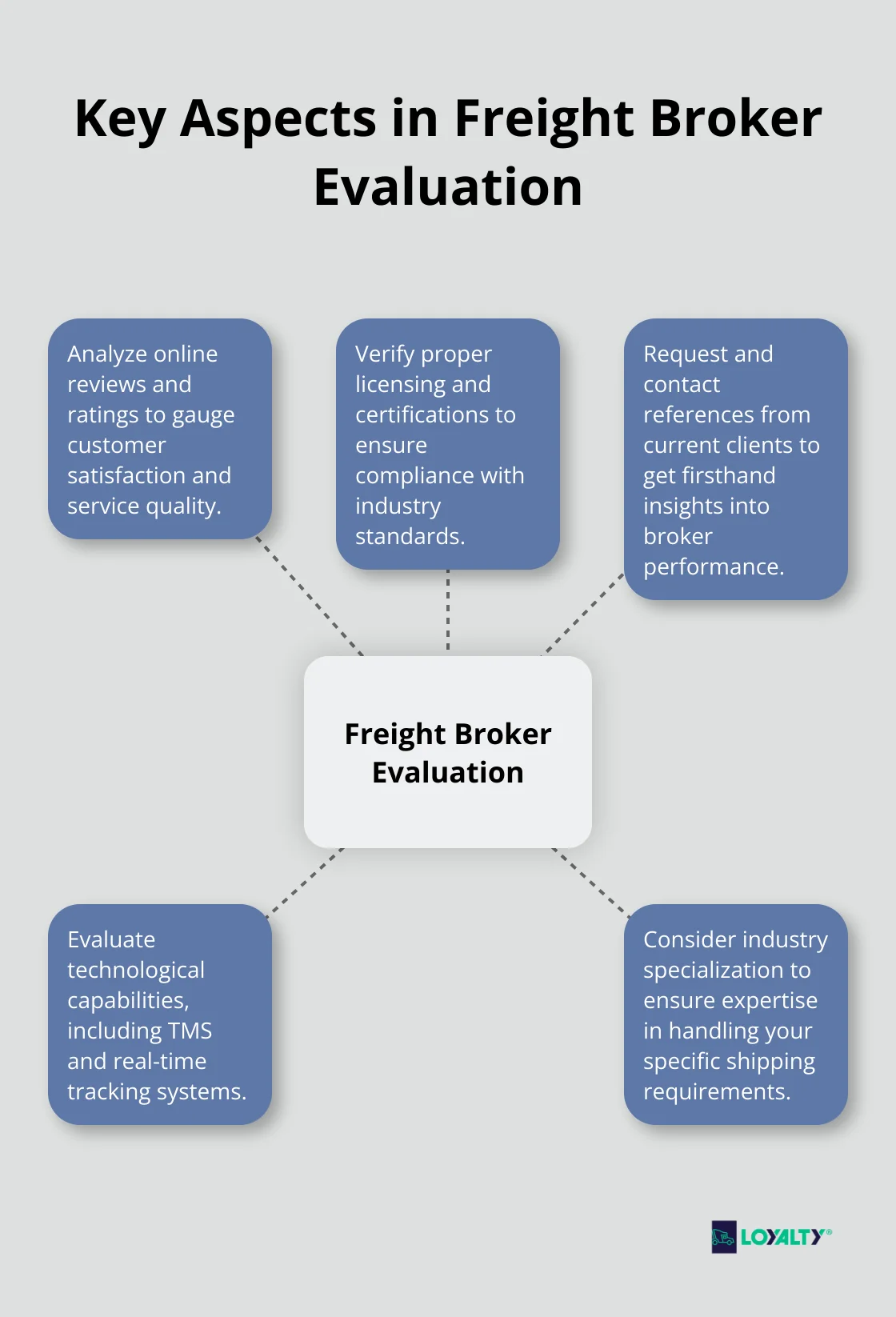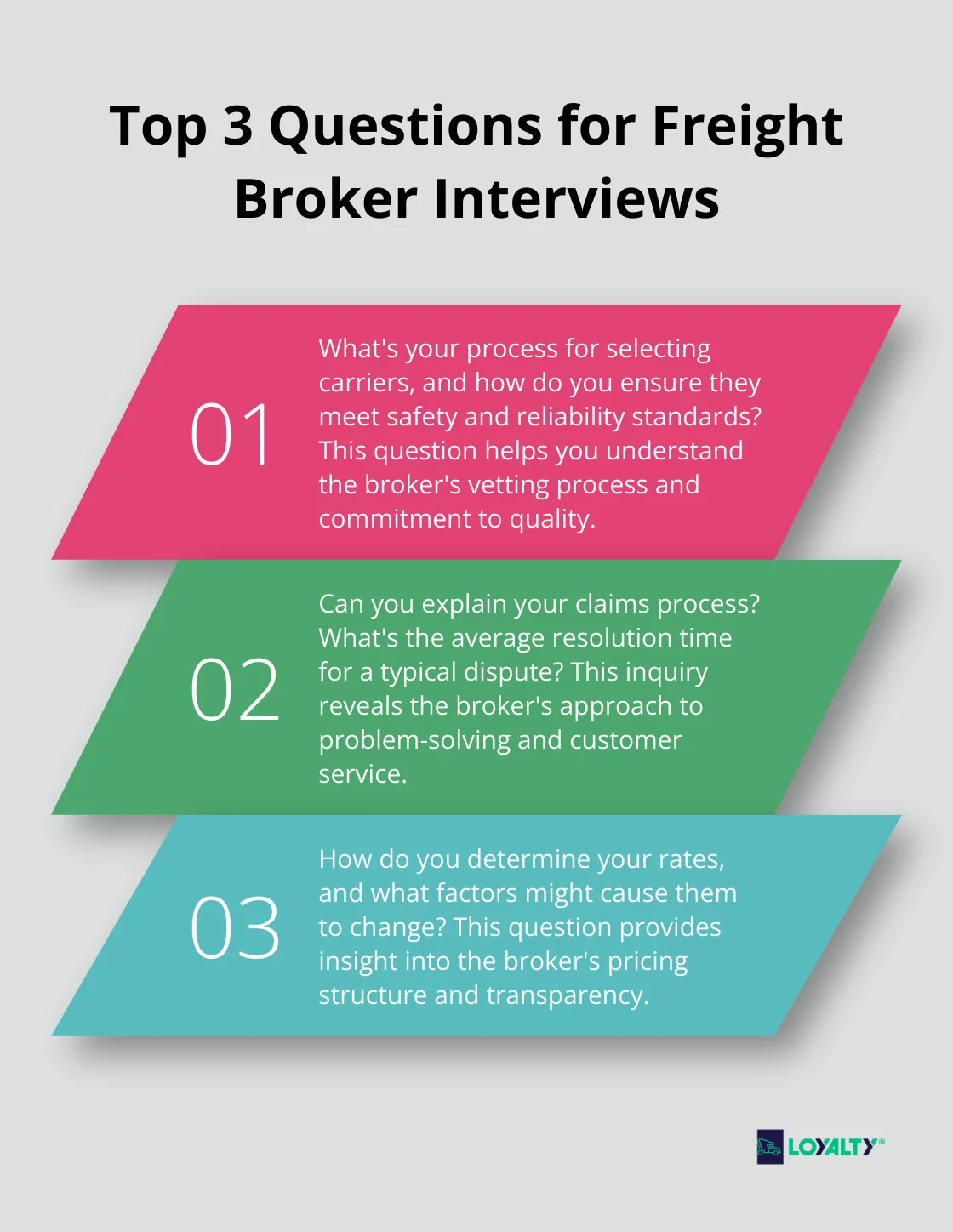Finding the right broker for freight can make or break your supply chain operations. At Loyalty Logistics, we understand the critical role these professionals play in streamlining logistics and reducing costs.
This guide will walk you through the essential steps to identify and select the best freight broker for your business needs. We’ll cover key qualities to look for, evaluation strategies, and important questions to ask potential partners.
What Makes a Top-Tier Freight Broker?
Deep Industry Expertise
Top-tier freight brokers possess extensive knowledge of the logistics industry. They understand the intricacies of various shipping modes, regulations, and market trends. This expertise allows them to navigate complex shipping scenarios and provide valuable insights to their clients. A broker with deep industry knowledge can advise on the most cost-effective routes or suggest alternative shipping methods during peak seasons.
Vast Carrier Network
A freight broker’s strength lies in their network of reliable carriers. The best brokers maintain relationships with a diverse range of carriers, from large national fleets to specialized regional transporters. This extensive network ensures that they can always find the right carrier for your specific needs (whether it’s a refrigerated truck for perishables or a flatbed for oversized loads). The American Trucking Associations reports over 3.5 million truck drivers in the United States, highlighting the importance of a broker’s ability to connect with the right carriers.

Financial Stability and Proper Insurance
Financial stability is essential when selecting a freight broker. A broker with a strong financial foundation can weather market fluctuations and ensure consistent service. Additionally, proper insurance coverage is non-negotiable. The best brokers carry adequate cargo insurance and contingent liability coverage to protect your shipments. The Federal Motor Carrier Safety Administration (FMCSA) requires freight brokers to maintain a $75,000 surety bond, but top brokers often exceed this minimum requirement.
Exceptional Communication Skills
Clear, timely communication distinguishes outstanding freight brokers. They should provide regular updates on shipment status, promptly address any issues that arise, and remain easily reachable when you need them. A 2023 logistics industry survey found that 87% of shippers cited communication as a top factor in broker selection. The best brokers leverage technology to enhance communication, offering real-time tracking and instant notifications.
Technological Capabilities
In today’s digital age, a top-tier freight broker must embrace cutting-edge technology. Advanced Transportation Management Systems (TMS), real-time tracking solutions, and data analytics tools are essential for optimizing routes, reducing costs, and improving overall efficiency. Brokers who invest in these technologies (and continuously update them) can provide more accurate quotes, faster service, and valuable insights into your supply chain performance.
As you evaluate potential freight brokers, keep these qualities in mind. The next section will guide you through the steps to effectively assess and compare different brokers, ensuring you find the perfect match for your logistics needs.
How to Evaluate Freight Brokers
Analyze Online Reviews and Ratings
Start your evaluation process with online reviews and ratings. Platforms such as Transport Reviews and FreightWaves offer valuable customer insights. Focus on recurring themes in feedback, both positive and negative. For example, multiple mentions of excellent communication or on-time deliveries indicate a strong performer. Conversely, repeated complaints about hidden fees or poor customer service should alert you to potential issues.
Don’t limit your assessment to star ratings alone. Read detailed reviews to understand specific experiences. A broker with a 4.5-star rating and comprehensive positive feedback often proves more reliable than one with a perfect 5-star rating but vague reviews.
Check Licensing and Certifications
Proper licensing is essential. Every legitimate freight broker must register with the Federal Motor Carrier Safety Administration (FMCSA). Use the FMCSA website’s search tool to verify a broker’s USDOT number and operating authority.
Look for additional certifications that demonstrate commitment to industry standards. Membership in the Transportation Intermediaries Association (TIA) indicates adherence to a code of ethics and best practices. The Certified Transportation Broker (CTB) designation, awarded by the TIA, signifies advanced knowledge and professionalism in the field.

Request References from Current Clients
Ask potential brokers for references from current clients, especially those in your industry. Direct conversations with these references can provide invaluable insights into the broker’s performance, reliability, and problem-solving abilities.
Prepare specific questions for these conversations. Inquire about the broker’s communication style, their handling of unexpected issues, and their track record for on-time deliveries. Ask about any cost-saving strategies the broker has implemented for the client. These firsthand accounts often reveal more than any marketing material.
Evaluate Technological Capabilities
A broker’s technological prowess can significantly impact your shipping efficiency. Request a demo of their Transportation Management System (TMS). A robust TMS should offer real-time tracking, automated documentation, and detailed analytics.
Assess their data security measures, especially if you’ll share sensitive information. Inquire about their ability to integrate with your existing systems. The best brokers offer user-friendly platforms that provide transparency and streamline operations.
Consider Industry Specialization
Different industries have unique shipping requirements. A broker with experience in your specific sector (e.g., pharmaceuticals, automotive, or perishable goods) can offer tailored solutions and navigate industry-specific challenges more effectively.
Ask about their experience with similar businesses and how they’ve addressed industry-specific issues in the past. This specialization can lead to more efficient operations and potentially significant cost savings.
Now that you understand how to evaluate freight brokers, let’s explore the critical questions you should ask when interviewing potential partners. These inquiries will help you dig deeper into their operations and ensure they align with your business needs.
Essential Questions for Freight Broker Interviews
When you interview potential freight brokers, you need to ask the right questions to uncover vital information about their operations, reliability, and suitability for your business. We’ve compiled a list of key inquiries that will help you make an informed decision.

Carrier Vetting and Selection
Ask about the broker’s carrier vetting process. A reputable broker should have a strict system for evaluating and selecting carriers. They must check for proper licensing, insurance coverage, and safety ratings. Ask how often they update their carrier information and what specific criteria they use to approve carriers.
For example, you might ask: “What’s your process for selecting carriers, and how do you ensure they meet safety and reliability standards?” A strong answer will include details about regular safety audits, insurance verification, and performance tracking.
Claims and Dispute Resolution
Understanding how a broker handles claims and disputes is vital. Ask about their process for addressing issues like damaged goods, late deliveries, or billing discrepancies. A good broker should have a clear, efficient system for resolving problems.
You could inquire: “Can you explain your claims process? What’s the average resolution time for a typical dispute?” Look for answers that demonstrate a structured approach, with specific timelines and steps for resolution.
Pricing Structure and Payment Terms
Transparency in pricing and payment is essential. Ask about their pricing model, any additional fees, and payment terms. Make sure you understand how they handle market fluctuations and seasonal rate changes.
A relevant question might be: “How do you determine your rates, and what factors might cause them to change?” The broker should explain their pricing structure clearly and discuss how they manage rate volatility.
Industry-Specific Experience
Inquire about the broker’s experience with shipments similar to yours. Ask for specific examples or case studies that demonstrate their expertise in your industry.
For instance: “Can you provide examples of how you’ve handled shipments for companies in our industry?” Look for detailed responses that show a deep understanding of your sector’s unique challenges and requirements.
Technology and Tracking Capabilities
A broker’s technological capabilities can significantly impact your shipping efficiency. Ask about their tracking systems, reporting tools, and how they use technology to optimize routes and reduce costs.
You might ask: “What kind of real-time tracking and reporting do you offer? How do your tech solutions integrate with client systems?” The best brokers will offer advanced tracking capabilities and demonstrate how their technology adds value to your operations.
Final Thoughts
Selecting the right broker for freight impacts your supply chain efficiency and bottom line. We outlined a comprehensive evaluation process that emphasizes thorough research, credential verification, and direct communication with references. The interview process allows you to probe deeper into a broker’s operations and ensure alignment with your specific needs.
Loyalty Logistics understands the complexities of freight brokerage and its vital role in optimizing supply chains. Our commitment to sustainable transportation solutions, advanced logistics technology, and exceptional customer service has helped many businesses streamline their operations. We have experience handling diverse shipping needs across North America.
The time invested in selecting the right broker for freight will improve efficiency and reduce costs. You will position yourself to make an informed decision and forge a valuable partnership that drives your business forward. A freight broker is not just a service provider; it’s a long-term partner that can grow and evolve with your business.



